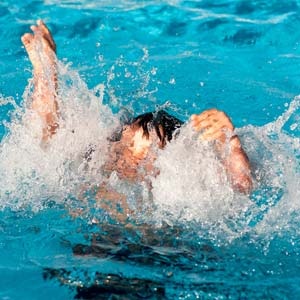
Black children are more than five times as likely to drown in swimming pools as their white peers, according to US health officials.
"There are striking disparities," said lead researcher Dr Julie Gilchrist, a medical epidemiologist in the division of unintentional injury prevention at the US Centres for Disease Control and Prevention.
Gilchrist thinks these disparities result from many minorities not having been taught basic swimming skills. "A teenager who drowns in a backyard swimming pool that is only 6- or 7-feet deep – that's just lack of basic swimming skill," she said.
Basic swimming skills
"There is evidence that suggests that African Americans lack basic swimming skills at greater numbers than their white or Hispanic counterparts," Gilchrist added.
Access to swimming pools is one problem. "But it's also a cultural choice as to how you spend your recreational time and dollars. I think parents perceive swimming as just another recreational activity, and they may choose soccer or baseball or basketball instead," she said.
Read: Joburg drowning figures double
Many parents don't see swimming as a necessary lifesaving skill, Gilchrist said. "Actually, learning basic swim skills, such as being able to right yourself in the water, control your breathing, float and swim 25 yards is lifesaving," she noted.
Gilchrist doesn't think learning swimming strokes is as important as learning survival skills. "As far as reducing these disparities, swim skills would go a long way," she suggested.
Drowning is a leading cause of injury-related death in children, according to the American Academy of Paediatrics (AAP). In 2006, about 1 100 US children younger than 20 died from drowning.
A necessity
According to the AAP, one study found that swimming lessons can reduce the risk of drowning by 88%.
Parents can find basic swimming programmes at local YMCAs and through the Red Cross, Gilchrist said. The CDC and the AAP support giving kids swim lessons. These lessons can start as early as the age of 1, Gilchrist said.
"Swimming is a lifesaving skill – it's a necessity, it's not a recreation," Gilchrist noted.
Read: Make Sure Your Kids Are Safe in the Water
In addition to swim skills, she said, lifeguards, life jackets, fences and bystander CPR are all important in preventing drowning.
The report was published in the CDC's Morbidity and Mortality Weekly Report.
According to the report, the risk of drowning among minorities, including American Indians/Alaska Natives and blacks up to age 29, is far greater than among whites.
Recommendations
An analysis of 12 years of data showed that the drowning rate for American Indians/Alaska Natives is twice the rate for whites, and the drowning rate for blacks is 1.4 times the rate for whites.
The greatest disparity is in swimming pool drowning, with black children aged 5 to 19 facing a 5.5 times higher rate than white children, the study found.
Do black South Africans swim?
Malawian blogger Sitinga Kachipande says the stereotype that black people cannot swim is false but persistent.
"It is a stereotype that has crossed the oceans and is applied to both Africans and their decendants. It centers largely on prejudiced theories that cite biological explanations (i.e. bone density, extra layer of muscle) or cultural explanations (i.e. ‘they just don’t like it’).
He says there is has been a history of exclusion based on economics and colour that has influenced efforts to access the water.
Finances have a bearing on one’s ability to swim for recreation – it costs time and money.
In places where there is no ready access to water, people have to rely on man-made places such as swimming pools which cost money to build and use. Black Africans have had restricted access to swimming pools that are both be privately or publicly owned.
"In reality, Africans can swim. They do swim, but why they are not known to be swimmers is a reflection of an activity marred by a history of inequality in politics and economics.
Rams Mabote wrote in the Mail and Guardian that he blames his mother for not being able to swim. Not having the luxury of looking out for him, she feared he may drown. Also, there weren't many pools in Dobsonville when he grew up.
Read more:
Stop your kids from drowning
Emergency call-outs for drownings increase
Scenarios preceding pool drowning identified
Image: Drowning boy from Shutterstock




 Publications
Publications
 Partners
Partners










